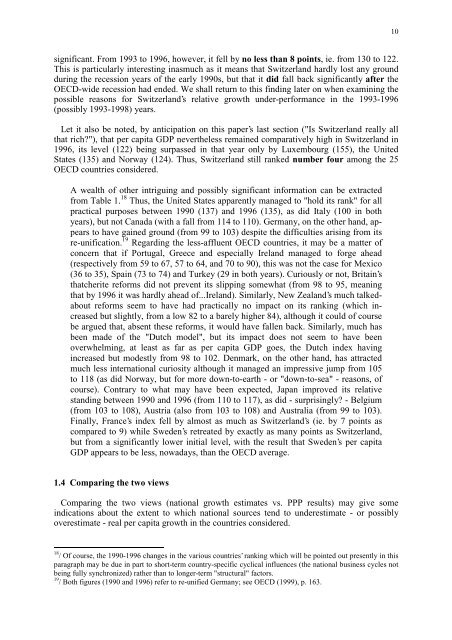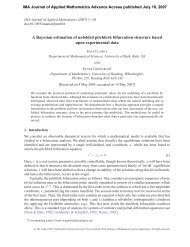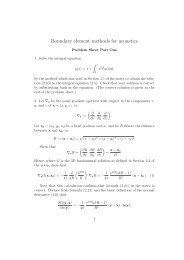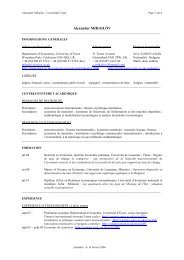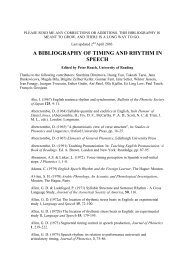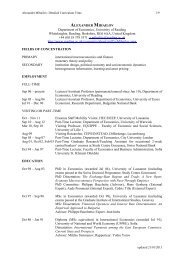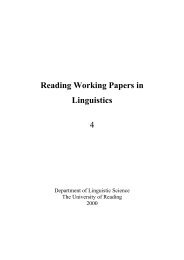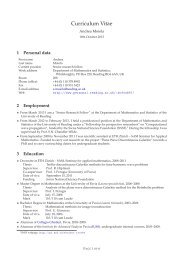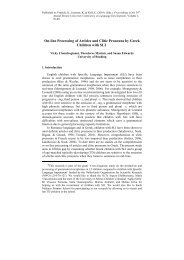Did the Swiss Economy Really Stagnate in the 1990s, and Is ...
Did the Swiss Economy Really Stagnate in the 1990s, and Is ...
Did the Swiss Economy Really Stagnate in the 1990s, and Is ...
Create successful ePaper yourself
Turn your PDF publications into a flip-book with our unique Google optimized e-Paper software.
10<br />
significant. From 1993 to 1996, however, it fell by no less than 8 po<strong>in</strong>ts, ie. from 130 to 122.<br />
This is particularly <strong>in</strong>terest<strong>in</strong>g <strong>in</strong>asmuch as it means that Switzerl<strong>and</strong> hardly lost any ground<br />
dur<strong>in</strong>g <strong>the</strong> recession years of <strong>the</strong> early <strong>1990s</strong>, but that it did fall back significantly after <strong>the</strong><br />
OECD-wide recession had ended. We shall return to this f<strong>in</strong>d<strong>in</strong>g later on when exam<strong>in</strong><strong>in</strong>g <strong>the</strong><br />
possible reasons for Switzerl<strong>and</strong>’s relative growth under-performance <strong>in</strong> <strong>the</strong> 1993-1996<br />
(possibly 1993-1998) years.<br />
Let it also be noted, by anticipation on this paper’s last section ("<strong>Is</strong> Switzerl<strong>and</strong> really all<br />
that rich?"), that per capita GDP never<strong>the</strong>less rema<strong>in</strong>ed comparatively high <strong>in</strong> Switzerl<strong>and</strong> <strong>in</strong><br />
1996, its level (122) be<strong>in</strong>g surpassed <strong>in</strong> that year only by Luxembourg (155), <strong>the</strong> United<br />
States (135) <strong>and</strong> Norway (124). Thus, Switzerl<strong>and</strong> still ranked number four among <strong>the</strong> 25<br />
OECD countries considered.<br />
A wealth of o<strong>the</strong>r <strong>in</strong>trigu<strong>in</strong>g <strong>and</strong> possibly significant <strong>in</strong>formation can be extracted<br />
from Table 1. 18 Thus, <strong>the</strong> United States apparently managed to "hold its rank" for all<br />
practical purposes between 1990 (137) <strong>and</strong> 1996 (135), as did Italy (100 <strong>in</strong> both<br />
years), but not Canada (with a fall from 114 to 110). Germany, on <strong>the</strong> o<strong>the</strong>r h<strong>and</strong>, appears<br />
to have ga<strong>in</strong>ed ground (from 99 to 103) despite <strong>the</strong> difficulties aris<strong>in</strong>g from its<br />
re-unification. 19 Regard<strong>in</strong>g <strong>the</strong> less-affluent OECD countries, it may be a matter of<br />
concern that if Portugal, Greece <strong>and</strong> especially Irel<strong>and</strong> managed to forge ahead<br />
(respectively from 59 to 67, 57 to 64, <strong>and</strong> 70 to 90), this was not <strong>the</strong> case for Mexico<br />
(36 to 35), Spa<strong>in</strong> (73 to 74) <strong>and</strong> Turkey (29 <strong>in</strong> both years). Curiously or not, Brita<strong>in</strong>’s<br />
thatcherite reforms did not prevent its slipp<strong>in</strong>g somewhat (from 98 to 95, mean<strong>in</strong>g<br />
that by 1996 it was hardly ahead of...Irel<strong>and</strong>). Similarly, New Zeal<strong>and</strong>’s much talkedabout<br />
reforms seem to have had practically no impact on its rank<strong>in</strong>g (which <strong>in</strong>creased<br />
but slightly, from a low 82 to a barely higher 84), although it could of course<br />
be argued that, absent <strong>the</strong>se reforms, it would have fallen back. Similarly, much has<br />
been made of <strong>the</strong> "Dutch model", but its impact does not seem to have been<br />
overwhelm<strong>in</strong>g, at least as far as per capita GDP goes, <strong>the</strong> Dutch <strong>in</strong>dex hav<strong>in</strong>g<br />
<strong>in</strong>creased but modestly from 98 to 102. Denmark, on <strong>the</strong> o<strong>the</strong>r h<strong>and</strong>, has attracted<br />
much less <strong>in</strong>ternational curiosity although it managed an impressive jump from 105<br />
to 118 (as did Norway, but for more down-to-earth - or "down-to-sea" - reasons, of<br />
course). Contrary to what may have been expected, Japan improved its relative<br />
st<strong>and</strong><strong>in</strong>g between 1990 <strong>and</strong> 1996 (from 110 to 117), as did - surpris<strong>in</strong>gly? - Belgium<br />
(from 103 to 108), Austria (also from 103 to 108) <strong>and</strong> Australia (from 99 to 103).<br />
F<strong>in</strong>ally, France’s <strong>in</strong>dex fell by almost as much as Switzerl<strong>and</strong>’s (ie. by 7 po<strong>in</strong>ts as<br />
compared to 9) while Sweden’s retreated by exactly as many po<strong>in</strong>ts as Switzerl<strong>and</strong>,<br />
but from a significantly lower <strong>in</strong>itial level, with <strong>the</strong> result that Sweden’s per capita<br />
GDP appears to be less, nowadays, than <strong>the</strong> OECD average.<br />
1.4 Compar<strong>in</strong>g <strong>the</strong> two views<br />
Compar<strong>in</strong>g <strong>the</strong> two views (national growth estimates vs. PPP results) may give some<br />
<strong>in</strong>dications about <strong>the</strong> extent to which national sources tend to underestimate - or possibly<br />
overestimate - real per capita growth <strong>in</strong> <strong>the</strong> countries considered.<br />
18 / Of course, <strong>the</strong> 1990-1996 changes <strong>in</strong> <strong>the</strong> various countries’ rank<strong>in</strong>g which will be po<strong>in</strong>ted out presently <strong>in</strong> this<br />
paragraph may be due <strong>in</strong> part to short-term country-specific cyclical <strong>in</strong>fluences (<strong>the</strong> national bus<strong>in</strong>ess cycles not<br />
be<strong>in</strong>g fully synchronized) ra<strong>the</strong>r than to longer-term "structural" factors.<br />
19 / Both figures (1990 <strong>and</strong> 1996) refer to re-unified Germany; see OECD (1999), p. 163.


